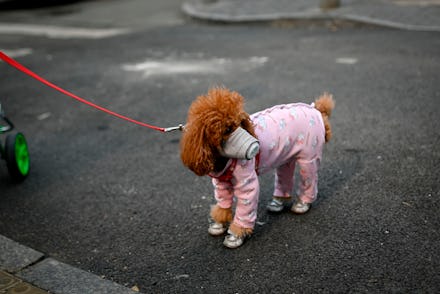Relax, your pet probably can't get coronavirus

Amid the new coronavirus outbreak, people are rushing to protect not only themselves from infection, but their dogs, too. Canine face mask sales have increased, USA Today reports, while Twitter user @camohanbn, who appears to live in India, posted photos of three (adorable) puppers in face masks, noting that “Dogs are also a means of Spreading Virus.” But do we really need to be worried about dogs getting or spreading the coronavirus?
As of today, more than 60,000 people have been infected with the new coronavirus, or COVID-19, and more than 1,000 have died, according to China’s National Health Commission. Late last month, the World Health Organization declared the outbreak a public health emergency. While people, especially in China, where 99% of the cases have emerged, may need to take precautions, veterinarians say the risk of your fur baby contracting or transmitting the virus is very low.
“There’s currently no evidence that dogs can become infected with the new coronavirus,” says Kristen Bernard, a professor in the UW School of Veterinary Medicine, consistent with the WHO’s statement on the matter. Like SARS, another type of coronavirus, COVID-19 is suspected to come from a bat, which might’ve transmitted it to another wild animal, possibly a pangolin, which probably passed it on to people.
Plus, the outbreak is thought to have started in a wild animal market in Wuhan, “not in somebody’s home with a pet or someone breeding dogs,” Bernard says. She adds that when researchers sequenced the genome of the COVID-19, it turned out to be closely related to other viruses found in wild animals, specifically bats, and unrelated to those that infect dogs
Ian Davis, a professor at Ohio State University’s College of Veterinary Medicine, agrees. While newly-emerging viruses seem to jump more readily from bats to people, “the likelihood of this transmitting from an infected person to a pet dog is extremely low.” Indeed, Bernard notes that we have yet to see even garden variety coronaviruses, such as those that cause colds in humans, make their way into dogs.
There’s no evidence that dogs can spread the virus either, based on the fact that past coronavirus outbreaks began in wild animals, she adds. A 2017 study traced the SARS coronavirus, responsible for an outbreak in the early 2000s to a population of horseshoe bats, which then transmitted it to another animal, possibly a palm civet or raccoon dog, neither of which are closely related to dogs. Likewise, the MERS coronavirus, first reported in 2012, came from camels.
While newly-emerging viruses seem to jump more readily from bats to people, “the likelihood of this transmitting from an infected person to a pet dog is extremely low.”
That said, “scientists hate to say never,” Bernard says. But while they can’t completely rule out the possibility that dogs can contract or spread COVID-19, that possibility remains remote, especially in the United States, where there have been only 14 confirmed cases of the virus.
If reports of the outbreak still make you uneasy, Davis says the safest bet is to take the same measures you normally would in order to protect yourself, and therefore your doggo, from getting sick: washing your hands often, staying home if you feel sick, and avoiding people who have respiratory infections.
As a general rule of thumb, it’s also a good idea to wash your hands whenever you pet your dog or handle their toys, and avoid touching your face or mouth until then, Bernard says. As far as we know, humans and dogs can’t transmit many viruses to each other, but they can transmit bacteria, including Salmonella and E. coli.
As for facemasks, they’re “pretty pointless,” Davis says. If you’re sick, wearing surgical masks and N95 respirators may help keep you from infecting others, but they won’t really prevent you from getting infected yourself. By the same token, putting a mask on your dog “might make you feel better, but it’s not actually going to protect your pet.” While it’s understandable to be concerned about your pupper in these scary moments, considering whether your fears are based in evidence can save you a ton of worry.